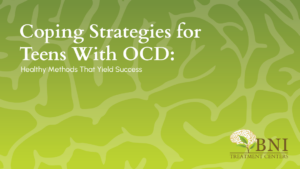
You want the best for your child and want to do everything you can for them. But what constitutes everything? Will giving them the newest iPhone or a piece of candy after dinner make them “spoiled”? What does “spoiled” even mean?
In the United States, 17% of youth (aged 6-17) are living with a mental health disorder. This can directly influence behaviors that can come off as being “spoiled”. Here at BNI Treatment Centers, we are Master’s and Ph.D.-level psychiatrists who work with teens experiencing severe mental health conditions, ensuring our qualifications meet each of their unique needs.
Today, we are discussing signs of a “spoiled” teen, and the underlying conditions that are manifesting.
How to Tell if Your Teen Is “Spoiled”
The term “spoiled” is rather outdated as it refers to parents who have no self-control when it comes to catering to their children’s wants and desires. It can also be seen as derogatory and cause negative feelings in parents and kids. This doesn’t happen because of a lack of control or confidence in their parenting skills, it stems from the child reacting to family stresses and age-related behaviors. Understanding this difference is the key to addressing the behavioral concerns of worried parents.
When Giving in Causes Harm
Parenting is not easy, and many will get their knowledge and skills from their upbringing. As generations move into parenthood, there is a mentality of not raising children the way they were raised. Millennials are said to be breaking parenting “norms” and adapting different techniques such as gentle parenting. This involves a more soft approach than authoritative parenting, focusing on empathy, respect, understanding, and boundaries.
Gentle parenting can be executed successfully, however, it can also lead to permissive parenting. This style of parenting involves very few rules and a lack of discipline. Research has shown this method involves giving in and letting the child make all of their own choices. In turn, this can lead to unhealthy eating habits, excessive internet and TV use, and impulsivity.

Lacking a Sense of Satisfaction and Empathy
Giving attitude is completely normal for teenagers, but there can be signs that something else is going on. Having a lack of satisfaction with completing tasks or schoolwork can be a sign of boredom, unfulfillment, or a combination of feelings. Boredom and lack of satisfaction can stem from feeling over-challenged or under-challenged.
There are many personality and mental health disorders that can result in a lack of empathy. Narcissistic personality disorder is one associated with empathy issues. It undermines interpersonal functioning that results in an inability to feel empathy for others. It can also be associated with borderline personality disorder and antisocial personality disorder. Seeking mental health treatment can identify and address these conditions to offer a better future.
Refusal to Follow Rules at Home or School
A refusal to follow rules can stem from having a lack of consequences. If there is no punishment for rule-breaking, your teen will most likely keep disobeying. Again, it can be difficult to set rules for parents because they do not want the same for their children that they had growing up. Having rules not only protects the child but also teaches them about society and what to expect in the world.
Relying on Materialistic Possessions to Fulfill Desires
It is common for parents to want to provide the best for their child. However, if the child has low self-esteem or is living with a mental health condition such as depression, that child can begin to see material possessions as fulfilling a void. Studies have shown that those living with high materialistic values are more likely to have depression, anxiety, and lower levels of well-being and life satisfaction.
Being Disrespectful Towards Authority Figures
It is normal for teens to rebel and occasionally show disrespect as they are still learning and changing with age. Having a complete lack of respect for authority can come from trauma. Children who experience abuse from adults they trust in their lives will have a more difficult time showing respect to other adults. Their trust in them was broken, and their mental health may be what is causing their behavior. Trauma therapy is the best option for healing from the past.
Lacking Responsibility and Accountability in All Aspects
Responsibility and accountability are skills that are taught. Similar to rule-breaking, lacking responsibility comes from not having consequences. Adding little projects and rewards for completion are great ways to teach responsibility and accountability, which will help the children prepare for their future careers. However, adding consequences when projects are not completed is also needed for the lessons to make a difference.
Having a Sense of Entitlement
Having a sense of entitlement is also related to mental health. Low self-esteem can present as arrogance and entitlement, even if the child doesn’t feel that way internally. They can associate their negative feelings with the world owing them something to make it better. Adding in responsibilities can help teach them respect and appreciation over entitlement.

How to Help Your Teen’s Mental Health in Los Angeles County
Acting out and pushing the system are normal behaviors for teens, but when they are managing acute or chronic mental health concerns, they may be trying to show it through these actions. The good news is that teen mental health treatment is available and can help your teen begin healing. Therapy and sometimes medication have been proven to manage and improve the quality of life for teens as they navigate their mental health.
If you have a teen in need of mental health care, don’t hesitate to reach out. BNI Treatment Centers specializes in teen mental health, with our psychiatrist-led treatment teams providing answers and options to get your teen back on track. Call us today at (888) 522-1504 to learn more about our program offerings.
BNI Treatment Centers: Science-based, evidence-backed, compassion-led.



